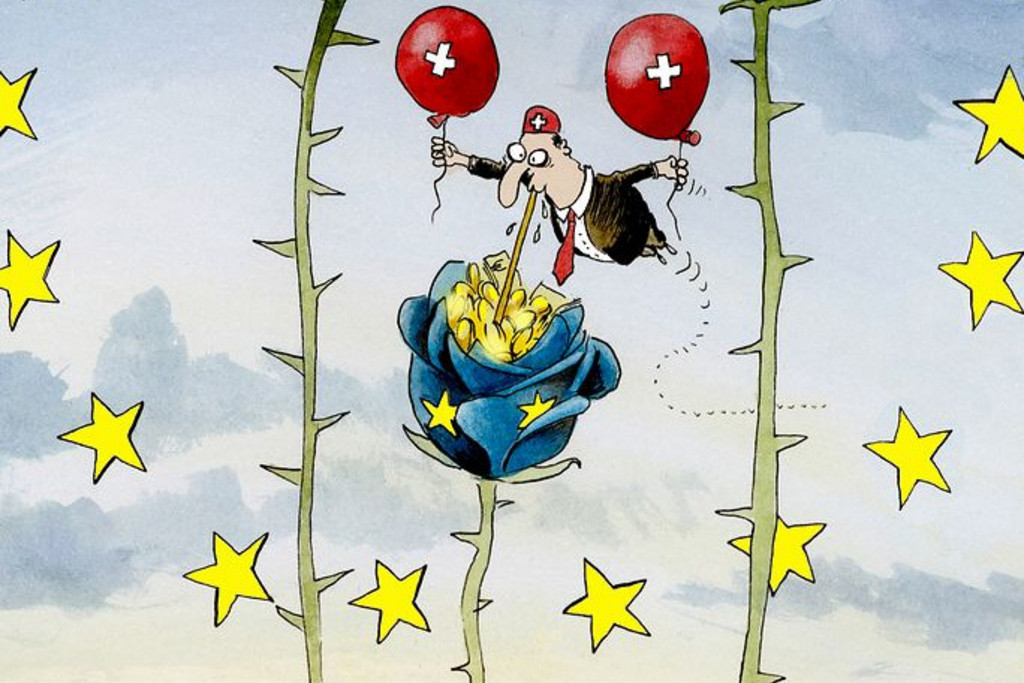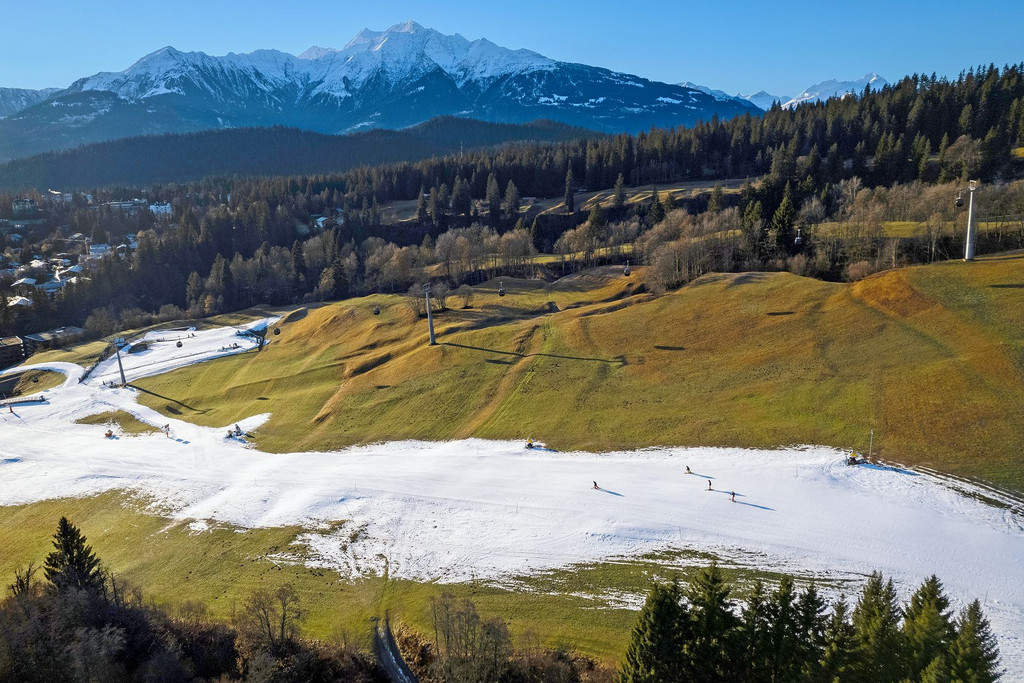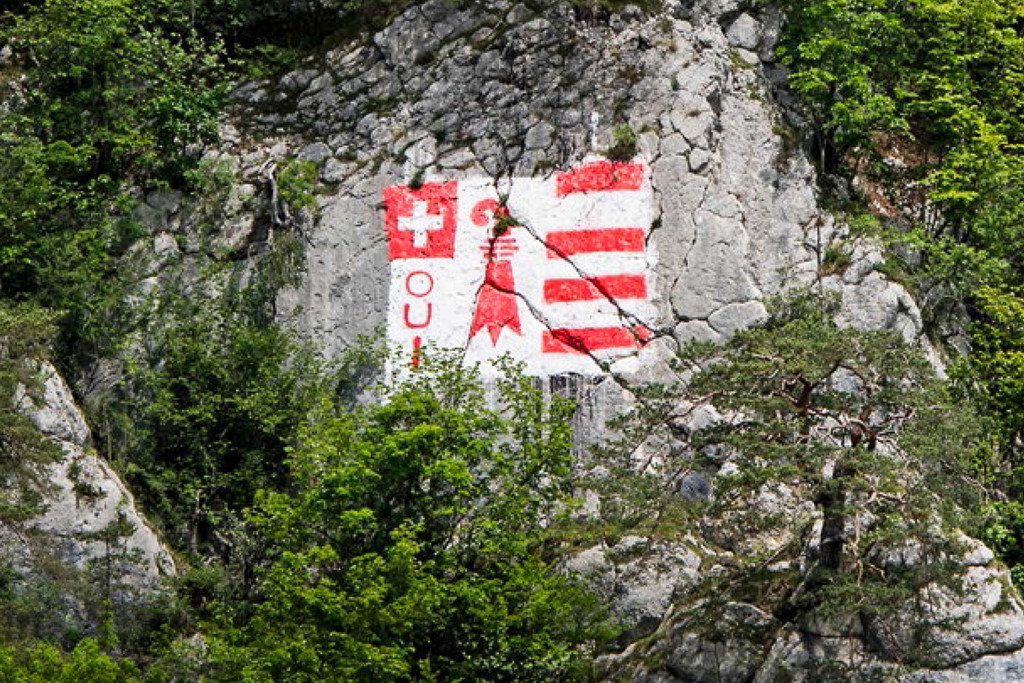Franz Weber has been part of the Swiss landscape for half a century. Baby seals and the artificial version in the form of miniature cuddly toys (an idea conceived by Judith Weber, Franz’s wife) are part of the childhood memories of generation X. They and their parents remember TV images of Brigitte Bardot hugging a baby seal on the ice pack. The year was 1977.
At the Hôtel Giessbach, on the steep banks of Lake Brienz, there is gratitude towards Franz Weber for rescuing the hotel complex. The crystalline lake, the belle époque boats and the small train climbing up to the hotel encapsulate the Switzerland that has always inspired the illustrious native of Basel and that the Swiss take delight in finding “untouched”. In Valais, Weber’s shadow is cast over the villages, and the townspeople who wander this countryside are full of empathy and admiration for this man who was sprayed with liquid manure in Val d’Anniviers whilst campaigning to protect the area from developers. “I prefer manure to concrete,” he quipped after the event. The residents of Val d’Anniviers later thanked him for his efforts, as René Langel recounted in a biography published in 2004*. Will the people of Valais also thank him for persuading the Swiss to restrict the building of second homes in their valleys in 2012? Only time will tell.
“An autocrat but in the best possible sense”
Travelling to interview Franz Weber in his beautiful home in Clarens, nestled a stone’s throw from Lake Geneva, was like going to meet a legendary hero. “Mr Weber, are you a hero?” we asked this 87-year-old gentleman who received us in a small, quiet dining room with walls decorated with prints. “I don’t think of myself in those terms. We can all be heroes in any given moment,” remarked the founder of Helvetia Nostra with a rather distant smile. His last battle – a third referendum to prohibit development on the Lavaux hillsides - ended in defeat. The approval by the people of a counterproposal mitigated this setback, “but while the bill is a compromise it remains dangerous because it gives the impression of affording good protection”, observed Judith Weber. Slender, charming and choosing her words with great care, she describes her husband as an obstinate lone wolf. “He acts like an autocrat but in the best possible sense,” she smiles. “It is not Franz’s way to surround himself with a big team. He indicates what has to be done and people either follow him or they don’t.” She has not always agreed with him but ultimately she is a great supporter of her husband’s work, which has engulfed her own life and that of her daughter Vera, who has now taken up the baton.
Franz Weber, like Winkelried and William Tell, but also perhaps like Christoph Blocher, whom he respects, is fearless
and uninterested in the middle way. “He has often been called upon for help by people in fear,” explained his wife. “But they are transformed after he has spoken to them. It’s as though they are filled with courage and are able to walk on water.”
Judith recalls two major battles – the protection of the site of Delphi against an industrialisation project and the campaign to save the Hainburg alluvial woodlands on the Danube in Austria (both in the 1980s).
Always voicing objection
In Surlej, Sempach, Lavaux, Crans Montana, Ouchy, Simmental, Jura, Ardèche and Provence, as well as in Australia and in Togo, Franz Weber has constantly voiced objection. He has said no to unreasonable and ugly real estate developments, no to motorways left, right and centre, no to industrial projects on unique sites, no to the slaughter of animals, no to seaplanes andvivisection. He even said no to arbitrary procedures when he took up the defence of an Afro-American – Carzell Moore – sentenced to death in the US after an apparently botched trial.
In the cosmogony of Franz Weber, the bad guys and the motives that drive them are patently clear. “It is personal gain which warps the conscience and leads to the destruction of what is beautiful,” he declares. The establishment and developers are in cahoots and are perverted by money. The politicians make decisions over the heads of the people and they have to be stopped. Public opinion will judge over the unscrupulous cliques and underhand dealings.
Where does all this anger come from? From the preaching of his father, who was a church minister? Or from his mother who died tragically when he was ten? Franz Weber is not very forthcoming on this subject and will not be pinned down. For him, a love of beauty and harmony (between buildings and nature) and the passion for protecting these assets are simply innate traits. “Genuine wellbeing is a beautiful landscape and happy people and animals,” concludes this pioneering ecologist. He denies being drawn to any political dogma. “I enlighten public opinion about what is at risk of being lost. I tell people: ‘Look, this landscape is a thousand times more important than the benefit to be gained by a handful of people.’ And it’s the majority who decides.”
Emotion and intelligence
Invited to the World Economic Forum in 1981, Franz Weber outlined his beliefs to an audience of incredulous decision-makers. He talks (mainly) about waste management and built-in obsolescence, touches upon operational savings (proposing shared vehicles), vehemently criticises “agro-chemistry” and defends the “polluter pays” principle. He focuses on the long-term value of the countryside, tackling the issue of the wellbeing of people in their environment, which is the definition of sustainable development. He also thinks along Malthusian lines as he believes the main cause of humankind’s problems is overpopulation. Does he lean towards the initiatives aiming to restrict the influx of foreigners to Switzerland? One might suppose so.
He draws his strength from a combination of emotion and intelligence. He is outraged by what he sees and, having been a journalist, he understands the role of the media perfectly. “I am completely honest and impartial and I rely on gut instinct,” he reveals. He considers nature, especially Switzerland’s, to be sacred. Engadine in the 1960s? Paradise on earth. “Switzerland has an abundance of outstanding places,” reiterates Franz Weber who is enthralled by their beauty. At what point does a landscape meet such criteria? What yardstick is used to measure beauty? Franz Weber does not answer these questions in a theoretical way. Beauty is self-imposing. Does he eat meat? “Only when I’m invited to dinner but never at home.”
Above the din of the world
In the large house in Clarens, purchased thanks to his earnings as a journalist in Paris, principally as a society reporter, time seems to stand still. But Franz Weber declares himself ready to continue the battle and to “fight until his last breath”. He is happy to show visitors his library but the entire house is full of books, points out Judith. His collection includes works by Gottfried Keller, Sartre, Goethe and Nietzsche, who reflected on a rock perched above the village of Surlej in Grisons. Franz Weber also shows us copies of the Voix des poètes, a periodical he edited with the Parisian Simone Chevallier, his partner at the time. Picasso, Salvador Dali, Somerset Maugham, Jean Cocteau, Françoise Sagan, Georges Simenon, Georges Pompidou, Brigitte Bardot, Mélina Mercouri, Grace Kelly, Yves Montand and Jacques Brel, etc. – the man is acquainted with many famous people. “But as time goes on, you begin to feel above the din of the world,” he reflects with a coy smile, calling his wife for assistance with dates, facts and scraps of information. Despite his age, Franz Weber has retained the art of symbolism. He demonstrated this last spring in Berne where, having been invited to give an address to public officials from the Federal Office for the Environment, he lit a torch and put it in the hands of the flabbergasted Director, Bruno Oberle. Rebekka Reichlin, who witnessed the event, admits that she was moved by the presence and the performance of the old campaigner. The communications officer said: “Many things would have been impossible to achieve in Switzerland without Franz Weber, particularly with regard to the protection of the landscape.” * René Langel, “Franz Weber – L’homme aux victoires de l’impossible “ ; Favre, 2004.
Stéphane Herzog is an editor with the “Swiss Review”






![[Translate to English:]](/fileadmin/_processed_/3/7/csm_max-spring-3-cartoons-de_3c29839370.png)






Comments